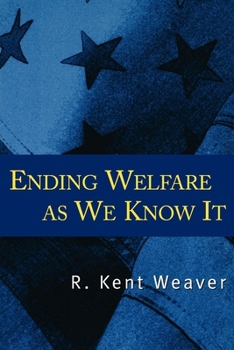Ending Welfare as We Know It
Select Format
Select Condition 
Book Overview
Bill Clinton's first presidential term was a period of extraordinary change in policy toward low-income families. In 1993 Congress enacted a major expansion of the Earned Income Tax Credit for low-income working families. In 1996 Congress passed and the president signed the Personal Responsibility and Work Opportunity Reconciliation Act. This legislation abolished the sixty-year-old Aid to Families with Dependent Children (AFDC) program and replaced it with a block grant program, Temporary Assistance for Needy Families. It contained stiff new work requirements and limits on the length of time people could receive welfare benefits.Dramatic change in AFDC was also occurring piecemeal in the states during these years. States used waivers granted by the federal Department of Health and Human Services to experiment with a variety of welfare strategies, including denial of additional benefits for children born or conceived while a mother received AFDC, work requirements, and time limits on receipt of cash benefits. The pace of change at the state level accelerated after the 1996 federal welfare reform legislation gave states increased leeway to design their programs. Ending Welfare as We Know It analyzes how these changes in the AFDC program came about. In fourteen chapters, R. Kent Weaver addresses three sets of questions about the politics of welfare reform: the dismal history of comprehensive AFDC reform initiatives; the dramatic changes in the welfare reform agenda over the past thirty years; and the reasons why comprehensive welfare reform at the national level succeeded in 1996 after failing in 1995, in 1993-94, and on many previous occasions. Welfare reform raises issues of race, class, and sex that are as difficult and divisive as any in American politics. While broad social and political trends helped to create a historic opening for welfare reform in the late 1990s, dramatic legislation was not inevitable. The interaction of contextual factors with short"





